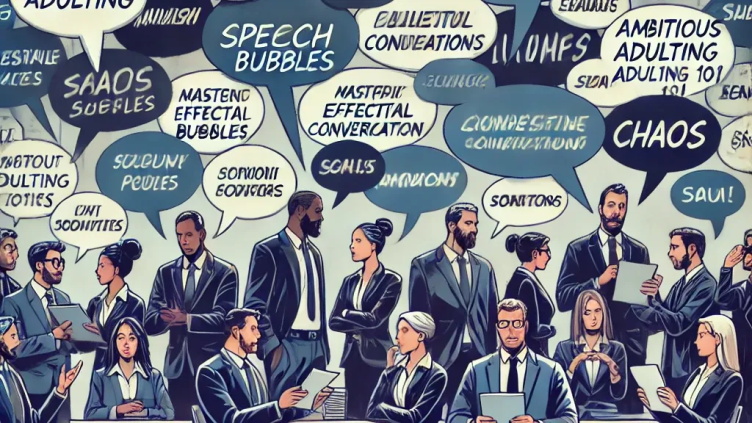“The current quality of your leadership and your life is fundamentally a function of how you are presently handling crucial conversations.” – Crucial Conversations: Third Edition (Link to Purchase on Amazon)
The ability to navigate tough conversations effectively is more crucial than ever. (Well, maybe you’re not about to get clubbed to death by another tribe’s leader… but when it comes to communicating with different personalities, generations, and individuals, most older generations will tell you that people are more sensitive and nervous than ever.)
Leaders, managers, consultants, and humans (Does that cover everyone?) often find themselves in situations where the stakes are high, opinions vary, and emotions run incredibly strong.
These are the moments that define our leadership and shape the outcomes of our projects, and organizations and are often a determinant in our continued successes.
Yet, many of us treat these exchanges as if we can just “wing it” and “it’ll work out.” (I’ve had people tell me they were fine because they were a “people person.” I wanted to tell them that the most awkward people I know say that exact… same… thing…)
If these moments define our leadership, perhaps we ought to study and practice these skills more than the once-a-year mandatory training that HR puts on. (Please DO keep booking them, HR Managers… I really like this job…)
What are “Crucial Conversations”?
A “Crucial Conversation,” as defined by Doctors Patterson, Grenny, and McMillan, is any conversation in which the stakes are high, emotions are strong, and/or opinions differ. (Examples could include failed projects, negotiations, or giving feedback to a team member, etc.)
These conversations can make or break relationships, morale, and even the direction of your business. The key to handling them successfully lies in our ability to approach them strategically. (I’d argue that most people don’t have a strategy at all—or worse, think they do, and randomly apply some parlor trick or tactic…)
An Environment of Safety
One of the fundamental principles in handling exchanges with other humans is creating a safe environment for dialogue. (It’s not JUST the conversation, consider everything around the conversation as well! This means psychological AND physical objects.)
When individuals feel safe, they are more likely to engage openly, share their true thoughts, and work towards resolutions more quickly.
I invite you to ask yourself:
- “Do others feel safe speaking up?”
- “Am I showing respect for their opinions?”
- “What is this human being trying to explain or express?” (Sometimes it helps to think of yourself as an alien and the speaker as a human being that you’re investigating, but that may be my ADHD talking…)
Master Your Stories
It’s easy to use dirty filters. (Ask any sales guy at a Jiffy Lube… those humans ALWAYS think that my current air filter is the dirtiest thing they’ve ever touched in 30+ years of handling cars…)
Our conversations can fall into the filters that assume negative intent or slip into stories that are simply our own emotional reactions to their stories.
When left unattended, these stories often escalate into all-out conflict rather than an actual resolution. (Just ask my CEO… When I explode in meetings, it’s generally due to me building a story in my head… Sorry, John Patterson!)
If we are to master our conversations, we must learn to separate facts from emotions.
The Art of Exchange – What Transactionally Competent People Do
Dialogue is about more than just talking—it’s more like an art than a science. (Don’t get it twisted—it IS a science, but when it’s put into motion, that’s when the “Dosey Do” begins…)
Do you practice your “Transactional Dance” moves? (I’d argue that it takes more than a simple waltz… you may want to learn how to become a “transactional ballet instructor”…)
You could also consider the exchange as “Judo.” (Although I prefer not to use analogies of people fighting when it comes to human exchange… there are certain conversations where the art of war may be more valuable and respectful to the other person than continuing to “dance.”)
“Most People Aren’t Listening…”
Kirkland looked me dead in the eye and said, “Josh, most people aren’t listening. they’re waiting for their turn to talk…”
That conversation hit it’s mark and it’s become a mantra of sorts. (This song plays on my brain’s radio station every single day, on heavy rotation…)
If you’re not sure if you’re actually listening—it’s smart to remember that the act of wondering about this during the exchange will immediately increase your transactional skills. (But it takes deliberate practice!)
Note for Professionals, both old and young: when you hear this phrase from a superior, your initial reaction may be to get quieter- totally cool to check if this phrase rings true, but I invite you to remember that its power is not a permission slip for them to be the authority “forever and ever, amen”. We often choose “Silence or Violence” in our conversations and both can be carried too far. YOU are also an adult doing your best at your job, just like they are.
The Most Vital Skill
If mastering exchanges is the most vital skill for humans, than perhaps we should practice. (Don’t YA think?)
By recognizing “Crucial Conversations,” creating an environment of safety, mastering your stories, and learning how to listen properly, you begin to increase the quality of almost all areas of life. (Hard to argue with that, huh?!)
After all, “The current quality of your leadership and your life is fundamentally a function of how you are presently handling crucial conversations.” – Crucial Conversations: Third Edition (Link to Purchase on Amazon)

